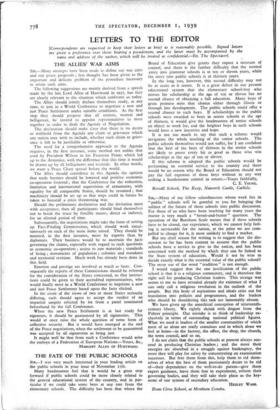LETTERS TO THE EDITOR
[Correspondents are requested to keep their letters are given a preference over those bearing a pseudo name and address of the author, which will be as brief as is reasonably possible. Signed letters nym, and the latter must be accompanied by the treated as confidential.—ED. The Spectator]
THE ALLIES' WAR AIMS
Stk,—Many attempts have been made to define our war aims and our peace proposals ; less thought has been given to the important and delicate problem of the procedure necessary to attain such aims.
The following suggestions are mainly derived from a speech made by the late Lord Allen of Hurtwood in 1937, but they are clearly relevant to the situation which confronts us today.
The Allies should jointly declare themselves ready, at any time, to join in a World Conference to negotiate a new and just Peace Settlement under suitable conditions. As the first step they should propose that all nations, neutral and belligerent, be invited to appoint representatives to meet together in order to draft the Agenda of Negotiation.
The declaration should make clear that there is no desire to withhold from the Agenda any claim or grievance which any nation may wish to include, whether such claim or griev- ance is felt to be justifiable or otherwise.
The need for a comprehensive approach to the Agenda requires, in the first instance, some method not unlike that used by President Wilson in his Fourteen Points which led up to the Armistice, with the difference that this time it would be drawn up by all belligerents and neutrals. In other words, we want a Peace Chart spread before the world.
The Allies should contribute to this Agenda the opinion that trade barriers should be lowered and positive economic co-operation fostered ; that the Conference for the reduction, limitation and international supervision of armaments, with equality for all comparable States, should be resumed ; that machinery should be set up so that steps could in future be taken to forestall a crisis threatening war.
Should the preliminary declaration and the invitation meet with acceptance, then all participants should bind themselves not to break the truce by forcible means, direct or indirect, for an allotted period of time.
Subsequently, the negotiations might take the form of setting up Fact-Finding Commissions, which should work simul- taneously on each of. the main items raised. They should be manned, in the first instance, more by experts than by diplomats. Their business would be to ascertain the facts governing the claims, especially with regard to such questions as economic co-operation ; access to raw materials ; standards of living ; movements of population ; colonies and mandates and territorial revision. Much work has already been done in this field.
Emotion and prestige are involved as much as facts. Con- sequently the reports of these Commissions should be referred for the consideration of the States concerned, so that instruc- tions could be given to their accredited representatives, who would finally meet in a World Conference to negotiate a new and just Peace Settlement based upon the facts elicited. In the event of the views of two or more States seriously differing, each should agree to accept the verdict of an impartial umpire selected by lot from a panel nominated beforehand by the full Conference.
When the new Peace Settlement is at last ready for signature, it should be guaranteed by all signatories. This would at once raise the whole question of some form of collective security. But it would have emerged at the end of the Peace negotiations, when the settlement to be guaranteed was accepted by all signatories as being just.
It might well be that from such a Conference would arise the embryo of a Federation of European Nations.—Yours, &c., MARGERY ALLEN OF HURTWOOD.












































 Previous page
Previous page